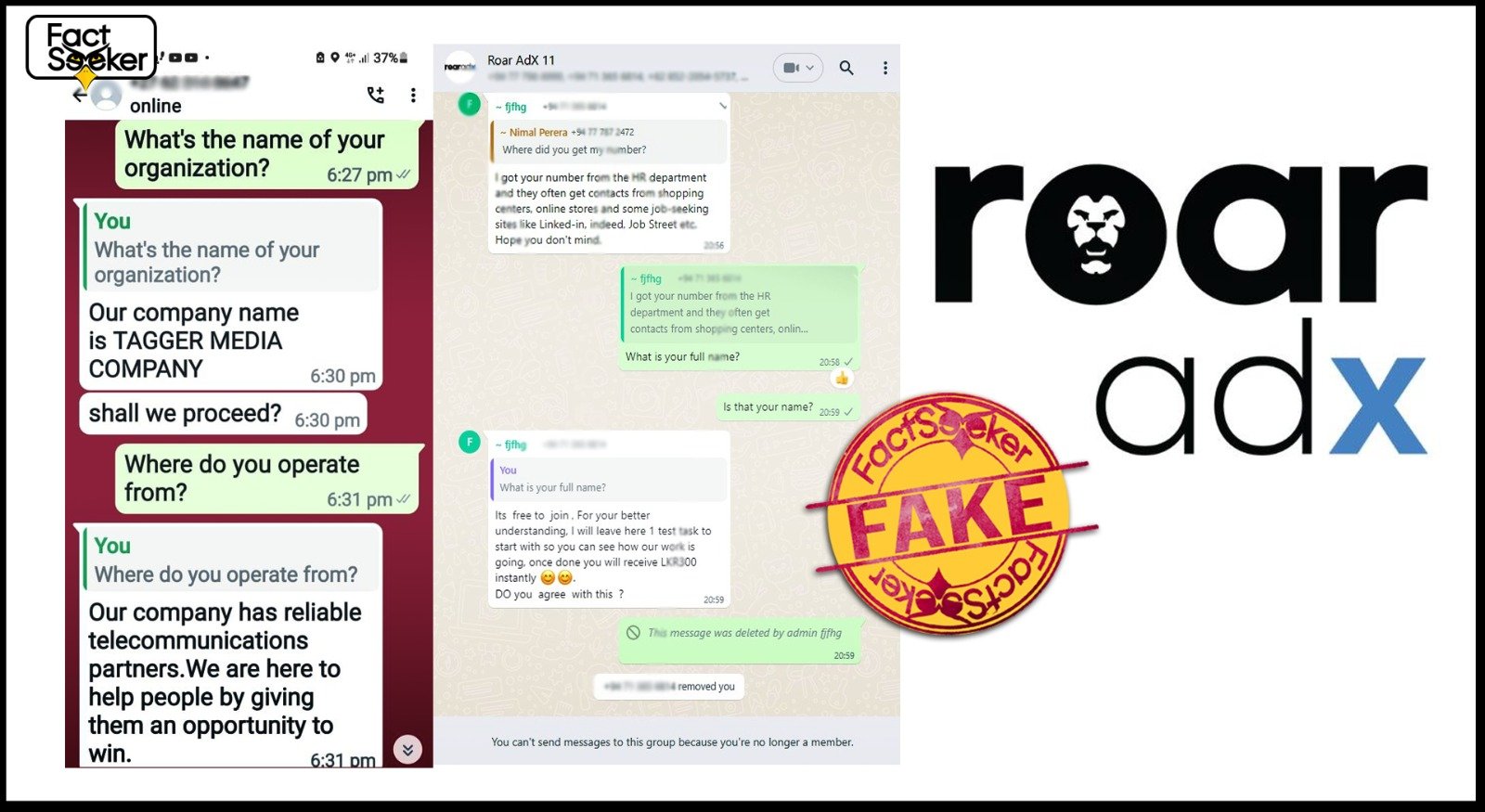Public warned against widespread of ongoing online scams

Authorities raise red flags over ongoing online scams, urging the public to refrain from providing personal information.
by Anonymous |
June 3, 2024

A wave of complaints regarding online scams have caught the attention of many as they fall for the bait of criminal masterminds that have used their skills to scam the public via social media platforms as well as the commonly used Meta’s instant messaging and voice-over IP service – WhatsApp –using names of reputed companies as a front, compelling FactSeeker to step in to investigate.
While many have lost substantial amounts by falling for prey to scammers, complaints have flooded in to alleged companies involved, the Computer Emergency Readiness Team (CERT) and even the Criminal Investigation Department (CID).
The scammers use foreign telephone numbers as well as VPNs to prevent their locations from being tracked by authorities and the legal system.
CERT along with other companies have issued warnings on their websites, many continue to fall for the scam as a majority of the targeted victims of the scammers are elderly. However, detailed investigations revealed that even well-educated groups such as doctors have fallen for the scam, resulting in substantial financial losses.
During initial stages of investigation, FactSeeker came to direct contact with a few scammers. Undercover investigations revealed that the scammers mostly access the mobile numbers of the victims via Telecommunication services.
However, the scammers commonly claim to be from the Human Resources teams of the reputed organisations, which was confirmed in FactSeeker’s most recent encounter with a scammer which occurred this morning.

A breakdown of how numerous financial scams operate identified by CERT are as follows:
Phishing Scams:
Scammers attempt to deceive recipients into providing sensitive personal information such as credit card details, passwords, or social security numbers.
They often pose as legitimate businesses, using convincing logos, brand names, or website replicas to gain credibility.
Fake Online Shopping/ Counterfeit Products/ Payment App Scam:
Scammers create counterfeit online stores, mimicking popular e-commerce platforms, and entice users with unbelievably low prices or exclusive deals.
Unsolicited messages are used to attract potential buyers to these fraudulent websites.
However, the merchandise they offer is frequently counterfeit, subpar, or never shipped, resulting in substantial financial losses for the victims.
Advance Fee Fraud:
In this scam, individuals are promised substantial financial gains, lottery winnings, or exclusive opportunities in exchange for an upfront fee.
Unsolicited messages are sent to unsuspecting victims, manipulating their trust and greed.
Once the fee is paid, the scammers disappear, leaving the victims empty-handed and financially devastated.
Prize or Lottery Scams:
Here, an attacker informs victims they’ve won a prize, lottery, or sweepstakes.
To claim their prize, they must provide personal details, pay a small fee, or click on a malicious link. The goal is either to steal sensitive information or money.
Bank Fraud Alerts:
These messages appear to come from the victim’s bank, warning about unauthorised transactions or suspicious activities.
The user is then prompted to click on a link to verify their transactions or call a number, both controlled by the attacker.
Malicious App Downloads:
Users receive a message promoting a useful or entertaining app.
Clicking on the download link leads to installing malicious software on the user’s device.
Impersonation Scams:
The attacker pretends to be a known organisation or individual.
The attack could be via a message pretending to be from a bank, government agency or a reputable company.
Account Suspension Scams:
These messages claim that an account (bank account, social media or any other service) has been suspended and prompt the victim to verify their identity by providing sensitive information.
Missed Delivery/ Parcel Scams:
Attackers send messages claiming that the victim has missed a package delivery, and they need to provide personal details or a fee to reschedule the delivery.
Prize or Lottery Scams:
Messages claiming that the victim has won a prize or a lottery, and they need to provide personal details or make a payment to claim the winnings.
Charity Scams:
In these attacks, scammers impersonate a charitable organization, asking for donations, usually following a large-scale disaster or during holiday seasons.
Urgent message scams:
These smishing attacks might warn a victim that their account is in jeopardy or delivery will be cancelled to get them to respond hastily without thinking.
Romance Scams:
Romance scams target individuals seeking companionship or romantic relationships online.
Scammers create fake profiles on dating websites or social media platforms, posing as potential romantic partners to establish trust and intimacy with their victims.
Once a connection is established, the scammer typically fabricates stories of financial hardship or emergency situations to solicit money or personal information from the victim.
Romance scams can have devastating emotional and financial consequences for victims who may be manipulated into sending large sums of money to their supposed love interest.
Accordingly, FactSeeker warns the public to beware of ongoing online financial scams.




